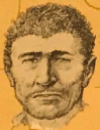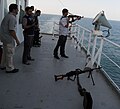Portal:Piracy
Introduction
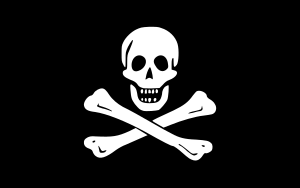
Piracy is an act of robbery or criminal violence by ship or boat-borne attackers upon another ship or a coastal area, typically with the goal of stealing cargo and other valuable goods. Those who conduct acts of piracy are called pirates, and vessels used for piracy are called pirate ships. The earliest documented instances of piracy were in the 14th century BC, when the Sea Peoples, a group of ocean raiders, attacked the ships of the Aegean and Mediterranean civilisations. Narrow channels which funnel shipping into predictable routes have long created opportunities for piracy, as well as for privateering and commerce raiding.
Historic examples of such areas include the waters of Gibraltar, the Strait of Malacca, Madagascar, the Gulf of Aden, and the English Channel, whose geographic structures facilitated pirate attacks. The term piracy generally refers to maritime piracy, although the term has been generalized to refer to acts committed on land, in the air, on computer networks, and (in science fiction) outer space. Piracy usually excludes crimes committed by the perpetrator on their own vessel (e.g. theft), as well as privateering, which implies authorization by a state government.
Piracy or pirating is the name of a specific crime under customary international law and also the name of a number of crimes under the municipal law of a number of states. In the 21st century, seaborne piracy against transport vessels remains a significant issue, with estimated worldwide losses of US$16 billion per year in 2004, particularly in the waters between the Red Sea and Indian Ocean, off the Somali coast, and also in the Strait of Malacca and Singapore. Modern-day pirates are armed with automatic weapons, such as assault rifles, and machine guns, grenades and rocket propelled grenades. They often use small motorboats to attack and board ships, a tactic that takes advantage of the small number of crew members on modern cargo vessels and transport ships. The international community is facing many challenges in bringing modern pirates to justice, as these attacks often occur in international waters. Nations have used their naval forces to repel and pursue pirates, and some private vessels use armed security guards, high-pressure water cannons, or sound cannons to repel boarders, and use radar to avoid potential threats. (Full article...)
Selected biography -
Micajah "Big" Harpe, born Joshua Harper (before 1768 – August 24, 1799), and Wiley "Little" Harpe, born William Harper (before 1770 – February 8, 1804), were American murderers, highwaymen and river pirates who operated in Tennessee, Kentucky, Illinois and Mississippi in the late 18th century. They are often considered the earliest documented serial killers in United States history.
Loyal to the British Crown during the American Revolution, the Harpes became outlaws after the war and began robbing and killing settlers in the remote frontier west of the Appalachian Mountains. They are believed to have killed 39 people, and possibly as many as 50. As the Harpes' crimes gained notoriety, vigilante groups formed to avenge their victims, and they were eventually tracked down and executed around the turn of the century. Their savagery has since entered American folklore, appearing to have been motivated more by blood lust than financial gain. (Full article...)Selected article -
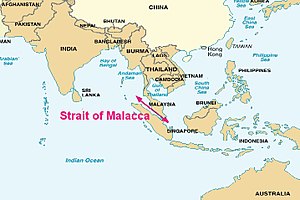
Piracy in the Strait of Malacca has long been a threat to ship owners and the mariners who ply the 900 km-long (550 miles) sea lane. In recent years, coordinated patrols by Indonesia, Malaysia, Thailand, and Singapore along with increased security on vessels have sparked a sharp downturn in piracy.
The Strait of Malacca's geography makes the region very susceptible to piracy. It was and still is an important passageway between China and India, used heavily for commercial trade. The strait is on the route between Europe, the Suez Canal, the oil-exporting countries of the Persian Gulf, and the busy ports of East Asia. It is narrow, contains thousands of islets, and is an outlet for many rivers, making it ideal for pirates to evade capture. (Full article...)Did you know?
- ... that indigenous Australian artist Daniel Boyd has depicted colonial figures including Captain James Cook and Governor Arthur Phillip as pirates?
- ... that the developers of Hotline Miami 2: Wrong Number suggested that Australian customers pirate their game?
- ... that Saudi Arabian broadcaster beoutQ pirated and resold beIN Sports programmes during the Qatar diplomatic crisis?
- ... that since 1904 the Gasparilla Pirate Festival in Tampa, Florida, has featured a pirate-themed parade?
- ... that HMS Redpole, one of the aptly-named coffin brigs, sank in an action with a pirate vessel in August 1828?
- ... that the opera The Devil and Daniel Webster features a jury of ghosts made up of famous historical American figures who are now residents of Hell; including the pirate Blackbeard?
- ... that red Jolly Roger flags were the most feared of all; all prayed they never encountered the "Bloody Red," which boldly declared that no mercy would be shown and all victims would be killed?
- ... that in 2011, pirates were reported as raiding along the Danube River in the center of Europe?
- ... that, unlike traditional Western societies of the time, many pirate clans operated as limited democracies, demanding the right to elect and replace their leaders?
Selected quotations
| “ | Now for our affair's are on the razor's edge, men of Ionia, wither we are to be free or slaves ... so if you will bear hardships now, you will suffer temporarily but be able to overcome your enemies | ” |
| — Dionysius the Phocaean | ||
General images
Selected Jolly Roger
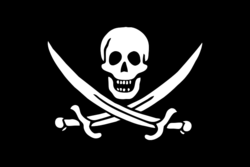
Subcategories
Topics
WikiProjects
Related portals
Things you can do

Contribute
- Work on piracy and pirate articles and help improve them to featured articles.
Expand
Join
WikiProject Piracy Requests
- eliminate red links from List of pirates
- expand Timeline of piracy, specifically to fill in vast gap between the 1890s to 2000s
- revise Bartholomew Roberts
- help with Requested articles and Expand articles
- help with Portal:Piracy
- Create Modern Piracy
Associated Wikimedia
The following Wikimedia Foundation sister projects provide more on this subject:
-
Commons
Free media repository -
Wikibooks
Free textbooks and manuals -
Wikidata
Free knowledge base -
Wikinews
Free-content news -
Wikiquote
Collection of quotations -
Wikisource
Free-content library -
Wikiversity
Free learning tools -
Wiktionary
Dictionary and thesaurus

